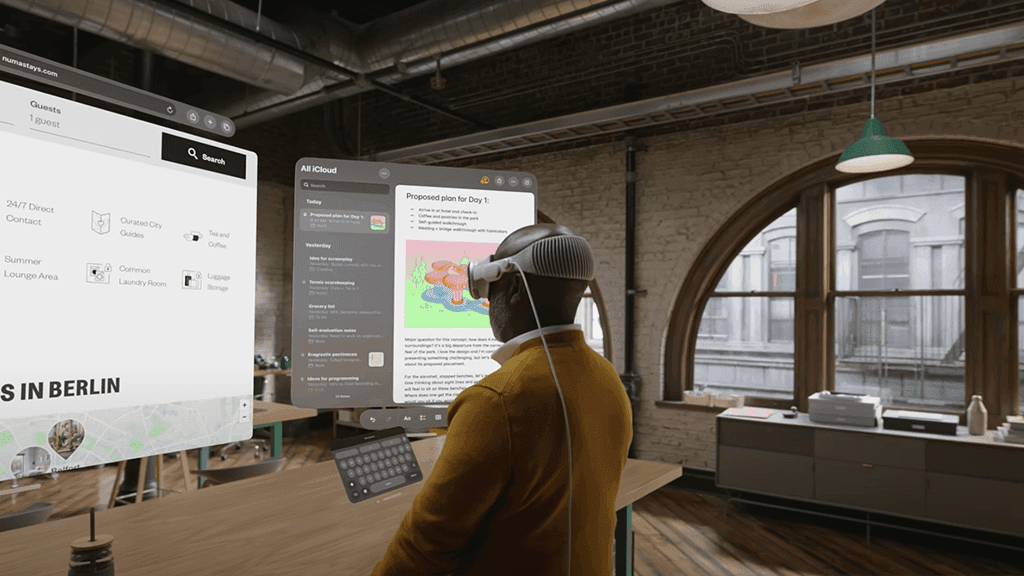BLOG: 12.03.2024
Die Zukunft des Büros
„New Work“, „Future City“ und der sprechende Bürostuhl. Eine Reise in die Arbeitswelt von morgen. Von Guido Walter
"What does the typical workday of an employee look like in the year 2050? We suspect it has something to do with Artificial Intelligence (AI). So, let's let ChatGPT speculate. Our clever everyday assistant assumes that by the year 2050, we will be using advanced augmented and virtual reality technologies. This allows us to work from anywhere in the world, whether it's physically in the office or in a co-working space in Bali. Virtual meeting rooms, project spaces, and collaboration platforms could, despite the occasional flop, such as the "Metaverse," then become everyday work tools. It's quite certain that AI will be everywhere, offering personalized recommendations for efficient work. Nobody will need to take on repetitive tasks anymore, as they will have long been automated. Modern technologies in 2050 ensure that everyone has more time for creative and value-added activities.
Total Flexibility
Talking about flexible working hours models? The flexibility of 2050 is hardly imaginable. Probably, we'll need an AI to tell us what work even is and what isn't anymore. Business trips? Dispensable in the age of virtual meeting rooms and not good for reputation either. If the denunciation of climate offenses progresses as exponentially as the performance of computer chips, companies will be reluctant to mess up their ecological footprint.
The Talking Office Chair
All the more important is to tailor office design perfectly to the needs of employees, which we as providers of such solutions, of course, mention entirely selflessly. Advanced technologies can be used to improve the ergonomic conditions of employees. Intelligent office furniture can be adapted to individual needs, and technologies for monitoring and promoting physical health can be employed. Sensors can even capture biometric data to make individual adjustments and maintain health. A talking office chair would be nice. "You've been sitting still for an hour already, why don't you move, take a short break." Or something like that.
Virtual Screens
The office furniture of the future will be even more focused on the well-being of employees. They will be designed to automatically adapt to different work styles and needs. Smart desks with wireless charging, interactive tables with touchscreen surfaces, and integrated power and data connections will be the norm. Virtual reality and augmented reality integration will be taken for granted. With "Spatial Computing," virtual screens float in the real office. The outside world captured by external cameras can be seamlessly faded in and out via a rotary dial.
Living in the Office
The separation between living and working environments will continue to blur. Office furniture could be designed to be more homely and cozy to create a pleasant working atmosphere. Couches, lounge areas, and plants contribute to making offices feel like inspiring and comfortable places.
Office and Emotional Intelligence
We already talk today about offices becoming places of encounter. With increasing automation, the importance of soft skills such as creativity, emotional intelligence, and interpersonal skills will become even more crucial. Traditional offices characterized by fixed structures and working hours will be a thing of the past by 2050. Remote work, coworking spaces, and virtual teams will be the norm. The office as a place of social interactions where we nurture personal relationships? Why not set up a special "Tinder corner" for singles? In 2050, if you're still not an empathetic entrepreneur, you won't stand a chance in the even fiercer competition for talent.
Strikes as Distant Memories
Late for the office? Nearly impossible in the future. In the Future City, smart technologies ensure efficiency, sustainability, and quality of life. Intelligent traffic management systems, connected buildings, and the use of Big Data to improve urban services are everyday occurrences. Strikes like those of the GdL will be remembered as faintly as today we remember the uprising of the weavers in Britain in 1750 when technological innovations led to upheaval in economic and work life.
The Digital Obligation
The digital transformation will likely be completed by 2050. If you're not thinking digitally now, you're already retired. "We can't take everyone on this journey," HR people like to say when someone doesn't have the right digital mindset. But in 2050, that won't be an issue anymore. A fundamentally positive attitude toward new technologies and processes has been successfully instilled in employees for years. The question "Too old for 'New Work'?" won't be asked anymore. The last Baby Boomers will probably still be working at 90, being ridiculed for their strange idea of an eight-hour workday.
The Importance of the Office
The classic single office, which lately was only used for representative purposes, will disappear. Nobody wants to sit alone in a glass box anymore, unless it's for laughs. The boss will then sit somewhere - in a nice, large, bright room. According to a survey by the Technical University of Darmstadt, office real estate already plays a big role in work and professional life today. 75 percent of respondents say that office real estate has a significant influence on their working life, while they also play an important role in the environment and quality of life of employees (38 percent). In the future, this importance will only grow.
So be prepared for anything."
